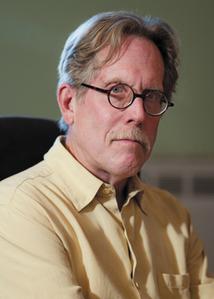
|
|
| photo: Eugene St. Pierre | |
Thomas Cobb is the author of the novel Crazy Heart, which was made into the 2008 Academy Award-winning movie of the same name. He's also the author of the Western Writers Spur Award-winning novel Shavetail, the George Garrett Award-winning story collection Acts of Contrition and the historical novel With Blood in Their Eyes. Cobb owned and operated Sixth Street Books in Tucson, Ariz., from 1977 to 1982; prior to that he worked as a ditch digger, warehouseman and carnival roustabout. He taught at Eastern Arizona College and at the Arizona State Prison in Florence, and directed the creative writing and literature at Rhode Island College for many years. Cobb lives with his wife in Rhode Island. His new novel is Darkness the Color of Snow (Morrow, August 18, 2015).
On your nightstand now:
A God in Ruins by Kate Atkinson. I introduced myself to Atkinson's work reading Life After Life. This is something of a sequel to that book. Atkinson is a rare writer who can pull off some impressive fireworks without disrupting her narrative. There's less trickery here than in Life After Life, and what's here is used to great effect. She's very good and she keeps honing her craft.
Favorite book when you were a child:
Uncle Wiggily and Baby Bunty by Howard R. Garis. This is actually the only one I really remember from childhood, and I still have it. In sixth grade, I read Don Quixote by Miguel de Cervantes, and that fairly knocked me out. In my teenage years, I was a big fan of a guy named Henry Gregor Felsen, who wrote cautionary novels about hot rods.
Your top five authors:
Vladimir Nabokov, Gabriel García Márquez, Flannery O'Connor, Alice Munro, Frederick Busch. These are all pretty contemporary, though Alice Munro is the only one still living. These are people whose writing drew me in immediately and never let me down or let me go.
Book you've faked reading:
The Last of the Mohicans by James Fenimore Cooper. This may have been the last book I faked reading. It was in graduate school, and I hated the book from the first page to the 20th, where I quit reading. I think Mark Twain's essay "Fenimore Cooper's Literary Offences" had already primed me to despise Cooper, though I'm pretty sure I could have gotten there on my own.
 Book you're an evangelist for:
Book you're an evangelist for:
The Night Inspector by Frederick Busch. Busch was a wonderful writer who deserves to be read far more than he is. This is not necessarily Busch's best, but it's a great read that can lead readers to the treasure trove he left behind when he died so unexpectedly. If I could write like anyone other than myself, I would chose Frederick Busch.
Book you've bought for the cover:
Unspeakable Practices, Unnatural Acts by Donald Barthelme. I bought this in paperback at the University of Arizona Bookstore in 1968. The cover and title were so hip and so sly that I had to have the book. I devoured it. Later, Donald Barthelme would be my dissertation director at the University of Houston, and we played in the same terrible rock band. He is possibly the smartest man I've ever known.
Book that changed your life:
The Centaur by John Updike. I read this book in high school, and I don't remember where I got it or why. But this novel was my first piece of real, contemporary literary fiction. I had never read anything like it, and I mark this as the beginning of my career in writing fiction.
Favorite line from a book:
"Just once, I'd like to shoot an educated man." From Lonesome Dove by Larry McMurtry. Every year of the 30-some odd years I spent in academia this line became more relatable and important to me.
Which character you most relate to:
Myself. The fine western writer Johnny D. Boggs, on a bet, used me as a character in his Civil War novel Wreaths of Glory. It's an odd thing to read yourself as a character in someone else's work, and I worked hard to identify myself with the character--a fierce fighter alongside William Quantrill (which seems to capture me pretty well), who gets killed early on (I had to disassociate myself in a hurry).
Book you most want to read again for the first time:
Lolita by Vladimir Nabokov. I've read it more times than any other book, probably approaching a dozen times. Each reading seems to open the novel a little more, like a flower just blooming. I admire Nabokov's ability to build worlds out of words, drawing us in while always reminding us that he is playing word games. It's miraculous.
What author you will never read again:
Henry James. I was forced to read several Henry James novels in college. I hated them all, and I rarely pass up an opportunity to insult James.

